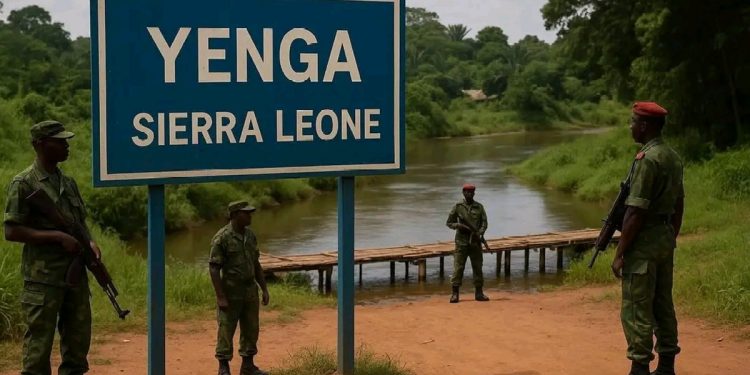By Hassan Osman Kargbo
Tucked away at the far Eastern tip of Sierra Leone, the small border town of Yenga has become the center of a long-standing and unresolved territorial dispute between Sierra Leone and neighboring Guinea. For over two decades, the people of Yenga—mostly Sierra Leoneans who have lived there for generations have lived under a cloud of uncertainty, fear, and neglect.
The dispute over Yenga, a town located in Kailahun District near the Makona River, dates back to the early 2000s when Guinean troops entered the area during Sierra Leone’s brutal civil war. Originally sent to help combat rebel forces, Guinean forces never fully withdrew after the war ended, and tensions over control of the town have simmered ever since.
Despite multiple high-level diplomatic engagements and public commitments from past and current Sierra Leonean leaders, the status of Yenga remains unresolved. The residents, caught between two governments, are left to bear the brunt of this political impasse.
“We are Sierra Leoneans, and we have been here for generations,” says Mariatu Koroma, a resident of Yenga in her early 50s. “But every day we wake up not knowing whether we are safe. The Guinean soldiers treat us like strangers in our own land.” she lamented.
Residents report frequent harassment by Guinean authorities, including unlawful arrests, property seizures, and restricted movement. The presence of Guinean troops in the area, often acting with impunity, has sown deep fear among the local population. Many families have fled, but those who remain live in constant distress. “There is no peace here,” says Mohamed Jalloh, a well-known business man in the area. “Our children grow up hearing gunshots; our women are afraid to farm far from home, and our men are sometimes beaten or locked up for no reason.”
In addition, the issue of Yenga has seen periodic attention from Sierra Leone’s highest offices. Late President Ahmad Tejan Kabbah and former President Ernest Bai Koroma both made diplomatic overtures to resolve the issue, with varying degrees of progress. In 2002 and again in 2012, joint declarations were made affirming Yenga as part of Sierra Leone. Yet the Guinean military presence remains.
When President Julius Maada Bio assumed office in 2018, hopes were high that a final resolution would be reached. In 2021, during a joint meeting with Guinean officials, he stated that “Yenga is not in dispute,” and expressed confidence that the matter was being handled diplomatically.
However, residents say the situation has hardly changed.
“President Bio is now in his second and final term, but we are still suffering,” says Bockarie Sesay, a youth leader in Yenga. “He promised peace and unity; but what kind of peace leaves your people in fear? What kind of unity allows foreign soldiers to mistreat your citizens?” he questioned.
Many Yenga residents feel abandoned, caught between broken promises and diplomatic delays. Local leaders are now calling for stronger action from the central government.
“This issue cannot be solved with press releases and handshakes,” said Pa Musa Saccoh. “It needs a decisive and nationalistic approach. We need action, not words.”
Furthermore, with every passing year, the dispute erodes not only the people’s trust in government but also their sense of belonging. For the youth, growing up in such conditions affects both their mental health and their hope for the future.
“I want to go to college, but my family can’t afford to send me far from home,” says Aminata Kallon, a bright student from the area. “But staying here means I have to live in fear. How do you focus on education when you don’t know if your home will still be safe tomorrow?”
Human rights groups and civil society organizations have repeatedly called for international mediation, pointing out the psychological toll the situation is having on the population. Some are urging ECOWAS and the African Union to step in and bring about a lasting solution.
As President Bio enters the final phase of his administration, many see Yenga as a test of his legacy on national sovereignty and human rights. Political observers argue that failure to resolve the Yenga issue could leave a stain on his record and further disenfranchise a long-suffering population.
For the people of Yenga, time is of the essence. “All we want is to live in peace on our land,” says Mariatu Koroma. “We have suffered enough. Let our President hear our cry and act before it’s too late.”
To conclude, The Yenga dispute is more than just a border issue—it is a humanitarian concern and a national integrity test for Sierra Leone. As the people continue to call for a permanent solution, the question remains: will their leaders finally rise to the occasion, or will Yenga remain a forgotten land in the shadows of diplomacy?











